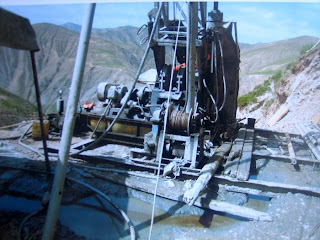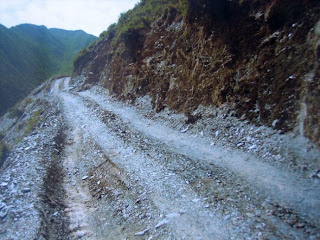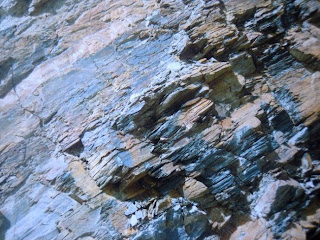The blog owner himself admits, "I don’t know how much influence it will have putting this letter and photos on the internet" but it is interesting that these issues of five years ago are re-surfacing online. It would seem that the issues of 2006 need still to be addressed. At the end of July 2011, High Peaks Pure Earth translated an appeal letter by locals affected by serious water contamination in the Kumbum area caused by mining activities.
Mining and subsequent environmental destruction as well as health concerns have also been the focus of blogposts by Woeser, see "Impoverished Matö County", "Please Stop the “Development” of Mount Kailash and Lake Manasarovar for Profit", "Avatar" in Tibet and "Songtsen Gampo’s Hometown Is About To Be Completely Excavated".
*Translation note, the three villages mentioned are 卡岗村, 上才乃亥村 and 才乃亥村 which have been rendered in pinyin in the translation below. If any readers can submit the Tibetan names of the villages to us (via email to hpeaks @ highpeakspureearth.com or leave a comment), we'd be most grateful.
Update November 21, 2011: Many thanks to a High Peaks Pure Earth reader who wrote in to inform us that the names of the villages are as follows, Khagang, Tsernak Gongma and Tsernak Sholma. The blogpost below has been amended to include these changes.
-----------------------------
A Letter to the Environmental Protection Department
Someone from the village of Khagang in Gepasumdo county, of Tsolho Prefecture in Qinghai Province, claiming to be a friend of the Khagang villagers, showed me a letter which was sent to Tsolho Prefecture dated 2006. It was titled “Appeal for the Prohibition of Mining and Environmental Destruction in Gepasumdo County, in the Balungwa (Ch: Bagou) Township and Sheep Grazing Area”, and included some photographs taken a few days earlier. It seemed that originally, the village representative had sought for an audience with authorities in Gepasumdo county, or even, in an extreme circumstance, to seek audience with authorities even higher up. But it is unknown who made the authorisation for the mining business to start again in the sheep grazing area.
I did not know what kind of damage extracting minerals and metals from the ground did to the water source and the local villagers. By searching on Baidu, I saw that similar cases of mining had caused harm to the people and environment. If lead were to somehow get into the water supply, experts say that it can cause hematopoietic system disease and brain damage. That is to say, the local villagers will suffer these abnormal conditions.
I heard from that villagers that when it rains heavily, the mining factory’s riverbeds run with a dark, green-coloured water. This green water then flows to the stream which passes through the village, and then onto the Yellow River. Because the villager’s drinking water source lies directly beneath the mining factory, some people are scared of drinking this water now but have no other alternative.
I don’t know how much influence it will have putting this letter and photos on the internet. I don’t know whether it can draw the Environmental Protection Department’s attention to those mining factory owners who wantonly cause this destruction, pollute the Yellow River and ruin the health of thousands of local villagers.
The mining industry has polluted the water and air in this area, which has made life for the local villagers a misery. Many villagers in these areas have already started to suffer from strange illnesses. If you were an educated person who came from this region, and you knew about this going on, it would be ridiculous to pretend that nothing was happening. If it were possible, we should pay attention to this, and make our voices to heard to the related official departments.
“Appeal for the Prohibition of Mining and Environmental Destruction in Gepasumdo County, in the Balungwa Township and Sheep Grazing Area”
To the Tsolho Prefecture Complaints Department:
Khagang, Tsernak Gongma and Tsernak Sholma are three villages in Balungwa township in Gepasumdo county are natural places for sheep farming in the Balungwa Township area. These three villages have existed for over 90 years, with a unique source of drinking water, a thriving population, bountiful harvests and lots of livestock. After the enforcement of the CCP’s “People Enrichment Policy”, the villagers’ lives have been generally improving, getting better and better every year. The population overall is around 2400, with about 30000 livestock. All this requires 4000 mu of land for farming, grazing and for the people to live on. With global warming, desertification is becoming more of a problem, and as a result, the river water is decreasing year by year. Droughts are becoming more frequent, causing problems for the shepherds who graze their flocks here. In order to address the problem of the lack of fresh drinking water for the population and their livestock, the government previously invested 12,000,000 Yuan and laid down 9 km of pipeline. The three villages were able to drink the clean mountain water, which meant that they no longer had to fetch water on their backs from the village of Gounie, which they had to do in the past. But in 1998, gold ore was discovered in the sheep grazing area. The villagers were initially strongly opposed to plans for further exploration and development of mining in this area, and thus, the development plans were stopped. In 2001, the mining proposals were initiated once again and planned to construct an ore-processing factory 8km away from the water pipeline. Afterwards, the villagers complained to the county, who reported back and gave consultation with a leading committee. It was decided that mining would pose a serious threat to the environment and cause damage and inconvenience to the local population. Overall, it was agreed that the project would cause more harm than good and so in 2005 was stopped once more.
Earlier this year, the district leader came to the three villages to pass on orders from the county authorities that the mining project was to restart again. This made the placated villagers angry once again. The villagers appealed to the government to reconsider the project, based on the facts of protection of local environment and the health of local villagers’ offspring. Based on the following the reasons, the villagers appealed for a ban on exploration and gold ore mining in the sheep grazing area:
1. Tsolho Tibetan Autonomous region is situated in a very cold area with a high altitude. It is the water source of three rivers, and our environment and wildlife is very weak. Once the environment is damaged, it will take a long time to recover. Our water source has already dried up. This is incompatible with the government’s strategy to greatly develop the West, and against the policy of protecting China’s waterways.
2. The proposed gold ore mining location is merely 10km away from our Mother River - the Yellow River. Once a mining factory is constructed, it will contaminate the existing water sources, harming 2400 people, 30000 livestock, and the surrounding 4000 mu of farmland. In addition, much of the contaminated water will flow into the Yellow River, endangering the livelihoods of those people who live downstream, and cause unimaginable damage.
3. If a high-grade ore is found, even if the government does not exploit it, there will still be illegal mining activities carried out, which will further damage the environment and exhaust our mineral resources.
4. The ownership of the grassland in the sheep grazing area is still disputable between two local districts: Balungwa and Gepasumdo town. According to the related laws, it is not permitted to carry out mining on disputed areas.
5. Every year the three villages as a show of gratitude, chant and say prayers blessing the water source in the hope that it will continue to benefit future generations to come. Here, the dharma of protecting and valuing nature is instilled in everyone, and there is a long-standing tradition of living in harmony. This public opinion, in keeping with national policy, will also benefit the people in the long run. Public servants should also take the lead and encourage people to look after and protect the environment themselves, in line with the “one governor, to benefit one people” idea. We should not destroy our natural environment. By allowing mining in this area, it will be too high a price to pay for a little short-term benefit.
In short, in order to protect the origins of the three rivers, the natural environment and wildlife, and the 2400 population and their future generations, we hope the governmental authorities will investigate this matter according to the environmental protection policies of this country and stop this mining development.
Thank you!
All Villagers from:
Khagang village
Tsernak Gongma village
Tsernak Sholma villagein Balungwa Township, Gepasumdo County.
 |
| Mining Equipment |
 |
| Worker |
 |
| Geological Structure |
 |
| Fragile land excavated |
 |
| Is it water or oil? |













No comments:
Post a Comment